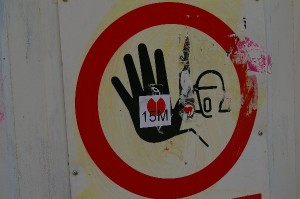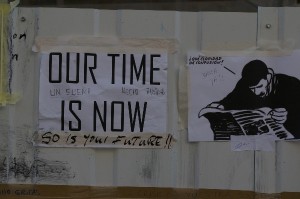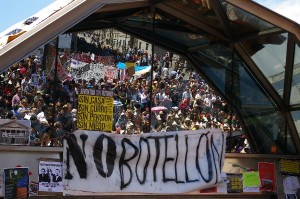“They have gathered 30,000 signatures but have forgotten what they are for.” Besides being purely mischievous, there is also a shade of truth behind this headline from satirical website El Mundo Today.

Over the last month, Spain has seen a swelling of civic outrage at its dysfunctional political system, expressed through the 15-M, or Democracia Real Ya, protest movement, whose members have occupied squares around the country. Those sleeping-bag protests are now ending and the most symbolic one of all, that in Madrid’s Puerta del Sol, has voted to pack up and move on.
Now, still bristling with outrage, 15-M is organising neighbourhood assemblies and one-off demonstrations, such as last week’s outside the Valencia parliament building, which is filled with politicians who are under investigation for corruption.
But, as El Mundo Today’s headline hints, while this movement undoubtedly has support, does it have a purpose?
“We want to change how people think and then we want to change the way in which we live together,” one representative of 15-M in Puerta del Sol told Iberosphere, shortly before the vote to pack up the protest there.
Those are lofty aims by any standards, but what do they mean? Something which became apparent during the month-long camp-out in Madrid was that while support for 15-M snowballed, so did the number of causes associated with it. Early in the protest, every single activist Iberosphere spoke to highlighted electoral reform as a main objective. But by the beginning of June, that message had become slightly obscured. A wander around the camp showed a bewildering array of banners and messages condemning bankers, corrupt politicians and the electoral system, while others supported a new housing law, employment initiatives, the Palestinian people, animal rights and much, much more.
However, a number of aims do now seem to dominate 15-M’s agenda: electoral reform to break the PP-Socialist duopoly; fighting political corruption; restoring powers to the welfare state; and standing up to economic powers such as the IMF/EU and the banking system.
For political analyst Víctor Sampedro, many of the changes being called for are simply common sense.

“Spain has not moved forward for years when it comes to certain reforms. What we’ve got now is a perfect storm made up of institutions that the Transition left us with, an unrepresentative bi-party political system and economic policies that are hurting the younger generations. It’s an unsustainable situation,” he said, painting a bleak picture of modern Spain.
“In the eighties, Felipe González said that for the first time, Spaniards felt proud of having a Spanish passport – and that was the Socialist Party’s achievement. But 30 years on, that’s no longer the case. The Spaniards who have been demonstrating in the squares are ashamed.” The 21-percent unemployment rate and a lack of separation of state powers are among the reasons for their shame, he added.
While Sampedro believes the movement’s pressure could lead to some positive changes, he does not see a serious electoral reform getting through Congress, given that the current system so clearly favours the two main parties.
Too many shows of hands
Another obstacle for 15-M is its studiously horizontal structure. It has no visible leadership, and all decisions – even trivial ones – are put to a vote. This is indeed “direct democracy”, but it’s also cripplingly inefficient when it comes to the reality of politics, where fast decision-making is often crucial. In addition, the movement has spread from Madrid right across the country, increasing its heft, but also making coordination much more challenging.
15-M’s broad appeal has been one of its strengths, drawing support from different age groups and Spaniards who insist they feel no affinity with either left or right. However, despite their insistence to the contrary, the movement does lean to the left, as political analyst and El País columnist Fernando Vallespín points out.
“They are very left wing in the sense that they are very interventionist,” he told Iberosphere. “So if you want to translate all their proposals into political measures, the first result would be a stronger state. They want stricter controls on politicians, stricter controls on what’s going on in business, stricter controls on practically everything.”
With this new left-leaning grass roots organisation making waves, the scene is set for a head-on collision with the traditional political right, after the Popular Party (PP) steamrollered the Socialists in May’s local elections. With the PP also heading for victory in the next general election, Spain’s decades-old left-versus-right division could open into a chasm.
Socialists take the hint
That, of course, would hardly be a desirable result of the “Spanish Spring”. On the other hand, there are already some tangible, positive consequences. Alfredo Pérez Rubalcaba, the Socialist candidate for the upcoming general election, has embarked on a “Q-and-A roadshow”, to hear out the concerns of party militants, especially in the light of their recent local election humiliation. This may be little more than lip service to direct democracy by the media-savvy Rubalcaba, but the move appears to have been prompted by the post-15-M mood.

Another encouraging development has been the engagement of many young people in politics. During the last decade, as house prices soared beyond their means, the jobs they were qualified for disappeared over the horizon and their elected representatives failed to represent them, Spain’s youngsters rarely found more to be outraged at than the banning of botellón public drinking parties. But almost overnight, much of that apathy has evaporated as economic and political injustices have become new talking points.
15-M’s power, it seems, lies not so much in the often rather woolly solutions it offers, but in its message: that things aren’t all right; that something needs to give. In a sense, the aim, expressed by one of the movement’s representatives, to “change how people think” has already been accomplished.
Great piece Guy, much more perceptive and professional than most of the rubbish pouring out of the mainstream press about this movement. You’ve done more homework and more pavement-pounding than the whole bunch of them and it shows.
So what next? I think the movement will gain momentum again beginning late September onwards, and will in fact be a major force in the general elections.
Rubalcaba will certainly pick up on some of their demands to control corruption in politics and make one or two policy planks out of them. Not that it will do him any good, mind. But they’ll be on the official agenda for the first time, so that’s a start.
Thanks, delighted you liked it. I think you’re right, 15-M will gain influence in the lead-up to the elections, if only in terms of highlighting the deficiencies of the mainstream parties. However, the recent publication of politicians’ assets was almost certainly prompted by the protests and the overall mood, so you could argue that 15-M’s impact has been substantial even over the usually quiet summer.